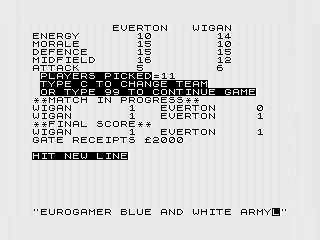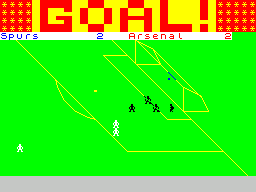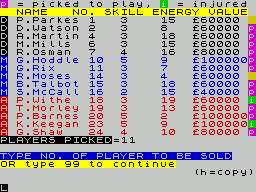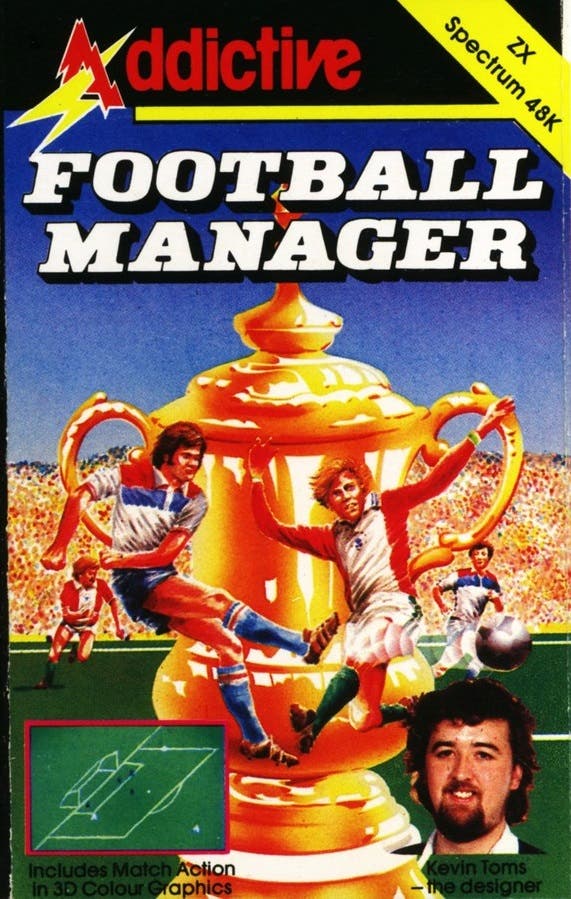From abandoned board game to birthing a genre: Football Manager at 40
Kick off.
Over the last ten years, I've interviewed many of my childhood heroes - those talented coders I used to read about in the pages of Crash or Your Sinclair. But today is different, because back in 1982, not only did Kevin Toms create a smash hit game, he invented a whole new genre.
"Conceptually, it was very different to most games," he explains to me via Skype. "At ZX shows, I had to constantly explain it was a football management game, and they'd go, 'oh, okay'." Often confused for some sort of weird text adventure, it was an abstruse concept for many - but not its author. "I already had the idea for the board game," explains Toms. "So I just thought a computer could do that, too."
From a young age, Toms harboured dreams of having a career in tabletop games. "When I was 15, my parents had to see the careers master at school," he says. "I asked them to ask him if it was possible to get a job as a board game designer." The inevitable reply came back. "He said it was a phase and that I'd grow out of it."
Undeterred, Toms continued with his main project, a combination of two of his loves. "I'm a football fan. I love football, although as a Torquay United fan, I'm used to suffering!" he grins. But fusing the sport into board game form was proving tricky. "I found it frustrating because certain things were very clunky. You could come up with nice ways to deal with results using the different strengths of the teams, but a fixture list is complex, and league tables are time-consuming to work out."
By the late 70s, Toms had already experienced a brush with computers, creating a simple Battleships game on an early programmable calculator. Then, in the early 80s, he spotted a TRS-80 clone while strolling in Tottenham Court Road. "It was called the Video Genie, and it was way cheaper than the TRS-80," he explains. "But it still cost £325 [around £1600 today]. My girlfriend at the time said it was a waste of money - I said, no, this is gonna make me money."



The switch from table to CPU was inspired. "When I got the computer home, I quickly realised the deficiencies of the board game could be eliminated - the computer could do all the calculations." In 1981, using the BASIC programming language, Toms recreated his pen and paper management game on the Video Genie. Despite the lack of graphics, he knew he was onto something when his friends played the result. "When people played it, they wouldn't get off it. It had an addictive quality." Sensing a real commercial opportunity, Toms used his initial impression to good effect. "I thought it was a good name, and accurate, because Football Manager was very addictive." Addictive Games was born, and then, in 1981, Sinclair Research unveiled its game-changing micro.
At just £49.95 for its kit form variant, the ZX81 revolutionised the home micro market, bringing computers to the masses. "I had looked at the ZX80, but it was only 1K," says Toms. "But the ZX81 - you could get a 16K RAM pack, and I adapted Football Manager to it." The new version proved a good move; in the first few months of selling Football Manager (via mail order), it sold 300 copies. The format breakdown was 297 on the ZX81 and just three on the Video Genie.
To help sales, the programmer booked full-page advertisements in Computer & Video Games, making the games and two-colour cassette inlays himself. It was an exciting time, despite cynicism from the establishment. "My accountant said [computer games] would fade out, like skateboarding," he smiles. "I thought, that's not going to happen because this is a new medium for games, and people have always played games. It was a new platform, but a really good one you could do a lot with."
Under the hood, the key to Football Manager is its maths and match engine, as Toms explains. "It uses the attributes of the teams but with a random element. It's a combination of algorithms and tuning, so in the end, the results are realistic. If a top team plays a bottom team, they'll normally win. But it doesn't always go to plan." In a unique respect, Toms was recreating the glorious uncertainty of football. "That way, you can play and enjoy it endlessly because you can never be quite sure what's going to happen."

Football fans lapped up Football Manager, relishing their chance to become boss of their favourite team - except for the supporters of one particular club. "Over the years, Southampton fans have given me so much grief!" bemoans Toms. The reason? The original versions of Football Manager failed to include the south coast club. As was common at the time, memory dictated everything. "The amount of text in the names of players and teams was critical. So the reason Southampton wasn't there was because the name was too long, and it didn't shorten very well. Everything in the original design was brutally pared down to work in the small memory. The transfer market is very lean and mean, but it works very well."
The randomisation of player skills at the end of each season also frustrated some players, especially when they witnessed their star player suffering a colossal loss of form. It was another memory-based decision by Toms. "It was the most efficient way I could keep the game's challenge going. Obviously, you built a better squad over time - but it was important to me that it didn't become boring."
As with the ZX81, Sinclair transformed the market again in 1982 with its follow-up, the ZX Spectrum. Blessed with a 'massive' 48K of memory, the release of the popular computer compelled the bricks and mortar stores to take notice of the computer game phenomenon. Toms, still part-time, acknowledges this was another turning point. "I finally went full time at the beginning of 1983 - all because of Spectrum orders from WH Smith."
Football Manager had finally hit the premier division, sitting on shop shelves up and down the country, Toms' beaming face greeting potential customers. "Ha!" he grins when I mention this. "I had to do a new cover for Smith's. And over time, I'd been demonstrating the game to people at trade fairs - when you told them you wrote the game, they'd get all animated and intrigued. And I saw a connection between computer games and books and music. Who cares that EMI is publishing a band? All people care about is the band." The result was the Kevin Toms fizzog proudly displayed on every copy of Football Manager. "I thought, this is good enough, I'll put my face on it. Then it just took off and became this thing. I never understood why others didn't do it."
The increased memory of the Spectrum finally allowed Toms to incorporate visuals into his masterpiece, which greatly helped sales. While blocky and basic, even for 1982, the match screen emphasised the excitement of seeing a game play out. "Some people are convinced that when the men are in a certain position, they know what's going to happen," grins Toms. "But that's not true - the game works it out as it happens. If you repeated certain moves, people would very quickly recognise that."

As Addictive Games became Toms' full-time focus, more games appeared, such as Software Star and President. But behind it all, Football Manager bubbled away, meandering up and down the charts like the team Toms infamously left out of the initial versions.
Copycats were rife, and by the time Addictive released Football Manager 2, the competition was fierce. Nevertheless, it was still a decent seller, no doubt helped by the legendary status of its forebear.
Burned out, like so many, by the frantic software industry of the 80s, Toms left games behind as he discovered a love of travel, working as a software developer in New Zealand, Canada, Germany and, finally, Holland.
However, in 2015, the enduring popularity of Football Manager compelled him to create a new game, Football Star Manager. With its simple graphics, it most resembles the ZX Spectrum version and includes the same captivating gameplay that has proved so, well, addictive, over the years. Today, Toms is busy working on another update called Football New Manager, building a platform that he hopes will evolve long-term.
Yet it was that original, released 40 years ago, where it all started, players gathered around a TV screen as they attempted to bring footballing glory to their team. The gameplay may have changed and become more complex with the many games in this genre that have appeared since, but that uncomplicated and fundamental appeal never dims.
"It's kinda why I still feel I've got something to contribute, actually," notes Toms as our conversation ticks into injury time. "I think [these games] haven't really changed very much, and a lot of things have gone in a direction which is not appealing to me - which is detail. I don't like lots and lots of stats. I prefer a more subtle depth."
It's that core simplicity of Football Manager that ensures it still appeals to so many today. "The connection for me was that I created something entertaining," concludes Toms. "And I think the important thing, the emotional highs and lows from following your team, are captured perfectly."
